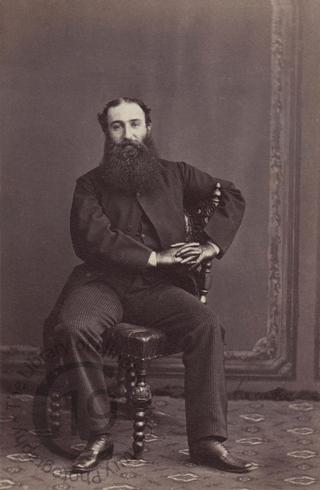
Marcus Lynch of Barna House, Galway
Born on 12 September 1836 at Barna in Galway, Marcus Nicholas Lynch was the son of Nicholas Lynch of Barna House and Elizabeth (‘Betsy’) née Grehan.
He succeeded to his father's position in 1862. According to Burke’s A Genealogical and Heraldic Dictionary of the Landed Gentry of Great Britain and Ireland (1863), his estate comprised 4,100 acres, with more land elsewhere.
On 15 October 1855 he joined the 33rd (The Duke of Wellington’s) Regiment of Foot as an Ensign. In September 1859 he was appointed Instructor of Musketry. He resigned his appointment with the rank of Lieutenant in June 1864.
On 9 May 1867 in Paris he married Blanche, the only daughter of Count Juliuz Marylski, of Leuczyca, Duchy of Posen, Poland (Burke’s A Genealogical and Heraldic Dictionary of the Landed Gentry of Great Britain and Ireland (1912).
Their marriage produced five children: two boys and three girls. The younger boy died a month before his eighteenth birthday on 25 June 1892. The elder son was a Captain in the South Lancashire Regiment; he died of enteric fever on active service in South Africa in 1900. The three daughters – Ida, Ethel and Violet – all became Sisters of Charity at Clarinbridge near Galway.
At some point prior to his death in South Africa, Nicholas Marcus Lynch was, according to some sources, captured and exchanged for the son of a Zulu chief. In another version of the story the boy was his native servant, which seems more likely since official sources place his birth in either ‘Tumtutu / French coast Africa’ (in 1885) or in ‘Timbuctoo’ (in 1889). Nicholas had served in the Muri Mountains in West Africa before his regiment was transferred to South Africa and had probably acquired the boy as a personal servant while he was there.
After Nicholas’s death this boy, Osman Tisani, came to live at Barna, where he became fluent in Irish, making him the first person of African origin by some 90 years to speak the Irish of the Galway Gaeltacht. In 1908 he served seven days in Galway Gaol for assisting ‘one John Caine to desert from the 88th Connaught Rangers.’
Although he is listed on the 1911 census as a 22-year-old valet at Barna House, he was probably regarded as more than a servant in the household since Lynch built a handball alley in the village for his amusement. Osman died of pulmonary congestion in the Ballinasloe Asylum on 2 June 1920.
Marcus Nicholas Lynch died, aged 80, at Barna House on 6 November 1916.
‘Deep regret will be felt throughout Galway and the West of Ireland at the announcement of the death of Mr Marcus Lynch, D.L., of Barna House, Galway. Mr Lynch, who had attained to over eighty years of age, passed away after a somewhat lingering illness. He was an extensive landowner, and the direct descendant of one of the thirteen tribes of Galway. He had been Chairman of the Galway Harbour Commissioners for over a quarter of a century, his election on each occasion being unanimous. One of his sons was killed in the South African War; the other died abroad. Two [sic] of his sisters [sic] are nuns, and one of them, a Sister of Charity, was by his bedside at his death. He took a deep interest in the little Catholic Church of Barna, of which he was a generous supporter; and he enjoyed the popularity of all classes’ (Freeman’s Journal, 8 November 1916.
His sister Lilly Lynch succeeded to the estate but it was taken over by the Land Commission in 1923 and finally sold after Miss Lynch’s death in 1930.
Photographed by Clarkington and Co of London.
Code: 127425




